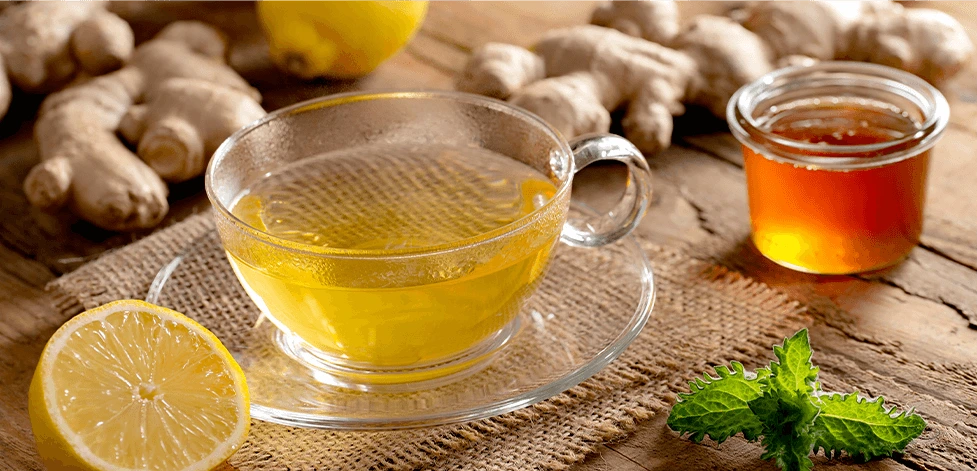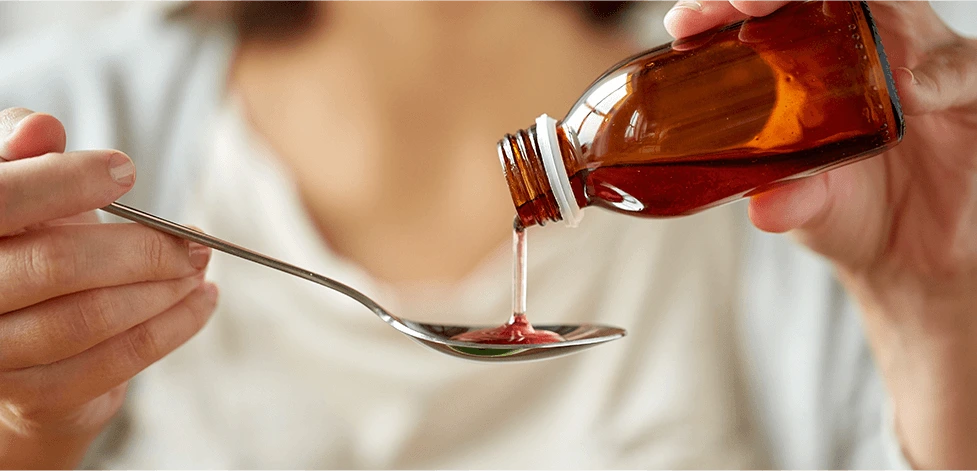What is a wet cough?
A cough is the body’s way of protecting the lungs. Sometimes coughing can bring up mucus, also called phlegm or sputum. When this happens, it is called a “wet” or "productive" cough.89

A cough is the body’s way of protecting the lungs. Sometimes coughing can bring up mucus, also called phlegm or sputum. When this happens, it is called a “wet” or "productive" cough.89

Drink lots of fluids. When sick, mucus can trickle down the back of the nose. Staying hydrated thins the drip so it’s less likely to irritate the throat and trigger a cough.
Swallow some honey. It soothes the scratchiness in the back of your throat. One study found that honey works just as well as over-the-counter drugs for calming nighttime coughs.
Other natural remedies include aloe and menthol. These can help reduce inflammation of the upper airways.
Sip a hot drink. It can ease cold symptoms, including a cough. The liquids are hydrating, and the heat helps to lower congestion. Chamomile and Ginger tea are good choices.
Over the Counter (OTC) options. Some natural OTC products that contain very low doses of aspirin also help reduce the symptoms of sore throat and cough.
Clear irritants from your home. Some people are sensitive to perfumes and fragrances in laundry detergents and air fresheners.
Sleep on an incline. If a cold or an allergy is behind your cough, try raising your head. When you lie flat, the mucus can pool and irritate your throat.
Gargle saltwater. Along with soothing a sore throat, gargling can also help loosen thick mucus. It can also help clear away allergens and bacteria.
Stamp out cigarettes. Smoking paralyzes the tiny hairs lining your lungs, called the cilia, which clear out mucus and dirt. That’s why some smokers get long-term cough.
Air humidifiers. A steamy shower or bath can help loosen the mucus and congestion behind your cough. A humidifier also may help.
Rinsing the nose. It flushes out cough-inducing mucus and allergens from your nasal passages and sinuses. Use a saline spray or try nasal irrigation.90

Wet cough treatments typically aim to improve cough efficiency, thereby helping people clear the airways.
Other treatments aim to clear phlegm and associated irritation in the back of the throat.
If the cough is due to an underlying medical condition, a doctor will prescribe specific treatments for that condition.
Some of the treatments below help improve cough efficiency. Others decrease mucus in the back of the throat, thereby reducing the need to cough.
Expectorants and mucolytics are medications that thin the mucus and make it less sticky. This makes it easier for people to cough it up
These medications work best for people who have a wet cough but are having difficulty getting the phlegm up.
Airway clearance devices, such as the oscillating positive expiratory pressure (PEP) device, use pressure and vibration to help shift phlegm from the airways during exhalation. This helps improve cough efficiency.
The treatment options for a wet cough also depend partly on the cause. Some more specific treatments include:
Antibiotics are helpful for a wet cough that occurs due to a bacterial infection.
People who experience a wet cough due to CHF may receive drugs called diuretics, which help relieve fluid retention. This, in turn, can reduce the amount of fluid in the lungs, which can help alleviate a wet cough.
People who have CHF may also receive drugs to:
reduce the heart rate
regulate the heart rhythm
control the blood pressure
reduce the cholesterol levels91
Wet coughs most often result from infections by microorganisms such as bacteria or viruses.
The entire respiratory system is lined with mucus membranes. Mucus keeps air ways moist and protects the lungs from irritants.
When fighting off an infection like the flu, however, the body produces more mucus than usual. It does this to help trap and expel the organism’s causing infection. Coughing helps you get rid of all the excess mucus that gets stuck in your lungs and chest.
There are other reasons why more mucus is produced, resulting in a wet cough. If your wet cough has been going on for more than a few weeks, it could be caused by:92
A respiratory infection
A wet cough often occurs as a result of a respiratory infection. Various types of respiratory infection can lead to an increase in mucus, including:
the common cold
acute bronchitis
pneumonia
Bronchiectasis
The bronchial tubes carry air in and out of the lungs. Bronchiectasis is a condition in which the surface tissue of the bronchial tubes becomes thick, floppy, and scarred, with a widening of the tube diameter as a result of chronic inflammation.
This results in excess mucus production, which can trigger a wet cough. Excess mucus production, leading to a buildup within the bronchial tubes, also increases the risk of a lung infection.
Chronic obstructive pulmonary disease
Chronic obstructive pulmonary disease (COPD) is an umbrella term for a group of chronic and progressive lung conditions. Some of these include:
emphysema
chronic bronchitis
refractory asthma
Some forms of COPD cause damage to the tiny air sacs within the lungs, while others affect the bronchial tubes, the bronchioles, or both.
Congestive heart failure
Congestive heart failure (CHF) occurs when the heart has difficulty pumping blood throughout the body. When this ineffective pumping occurs on the left side of the heart, it causes fluid to leak into the air sacs within the lungs. The result is a wet cough, crackles, and wheezing.
According to the American Heart Association (AHA), CHF may produce pink tinged mucus.
Wet cough in a baby or toddler
In children, coughs are caused by a viral infection most of the time. The next most common cause is asthma. All other causes of wet cough in children, such as the following, are rare:
Whooping cough presents in violent attacks of uncontrollable coughing. Children make a “whoop” sound as they gasp for air.
Cough in children is sometimes caused by inhaling a foreign body, cigarette smoke, or other environmental irritants.
Pneumonia is an infection in the lungs that can be dangerous in newborns and young children.92
A Cough Syrup that provides an effective relief from cough with mucus for children and adults should loosen the mucus, clears the airways, and protects your lungs so you can breathe freely again. Ambroxol hydrochloride, the active ingredient in Mucosolvan syrup does this.